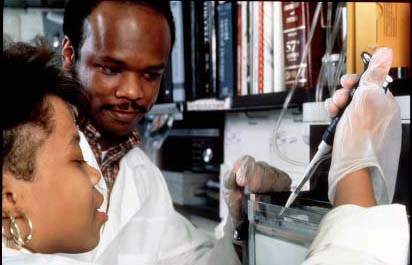
A recent study, reported in the journal Science, indicates that black, Latino and Asian scientists face discrimination in research grants awarded by the National Institutes of Health.
According to the study, Asian scientists are 3 percent less likely to receive awards. However, African-American scientists faced special discrimination and were almost 14 percent less likely to receive awards.
Dr. Tyeese Gaines writes in thegrio.com, “Regardless of achievement or education, black scientists are more likely to be rejected for medical research funding.”
The funds, “typically in the range of $1.6 million, including overhead, for a four-year project, are the foundation of independent biomedical research.”
While race and ethnicity are included in the application process, this information is not available to selection committees. The study suggested that other factors, including school attended or the applicants’ surname, may be a factor.
Even when resubmitting applications to NIH, black scientists face extra hurdles. “Black investigators that do resubmit have to do so more often to receive an award,” says Science.
On a positive note, the study concluded that while African Americans face far greater obstacles to high school and university graduation for those who do complete advanced degrees in biology and medical science: “Upon entering the biomedical academic career track, black and white faculty members are equally likely to be tenured at institutions that grant doctorates.”
Still the researchers found, it is “troubling that the typical measures of scientific achievement – NIH training, previous grants, publications and citations – do not translate to the same level of application success across race and ethnic groups.”
In addition to racial prejudice, perhaps a reason for ongoing patterns of discrimination is the influence of money and business in scientific research, at least in the opinion of one NIH scientist, Dr. Kevin Beck, a white researcher quoted by thegrio.com. He says, “One of the things that initially attracted me to careers in the sciences was that I believed science to be a meritocracy. Those with the best work published the best papers, got the best jobs, and got the most funding. After being in science for more than a decade, I no longer hold that viewpoint as strongly. While merit is important, science, like everything else, is a business and is political.”
African Americans only earn only 2 percent of PhDs in science.
Proposals to address the crisis include additional measures to mask the identities of applicants and mentoring for young scientists.
In an editorial, however, the Washington Post calls for a cultural revolution. The Post says. “…a hard truth is there must be a cultural revolution led by university deans, department chairmen, Nobel Prize winners and other scientific bigwigs. Until they become vocal advocates for enabling minority researchers to fulfill their potential – a key factor in the future of America’s scientific enterprise – progress will be halting and limited.”
Photo via NIH.










